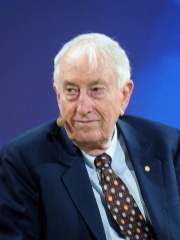
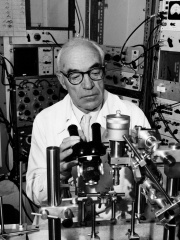
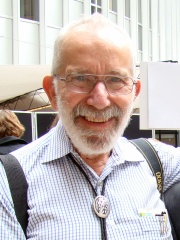
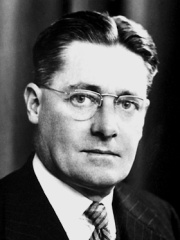
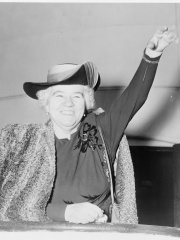
The Most Famous
PHYSICIANS from Australia
This page contains a list of the greatest Australian Physicians. The pantheon dataset contains 726 Physicians, 6 of which were born in Australia. This makes Australia the birth place of the 24th most number of Physicians behind Greece, and Finland.
Top 6
The following people are considered by Pantheon to be the most legendary Australian Physicians of all time. This list of famous Australian Physicians is sorted by HPI (Historical Popularity Index), a metric that aggregates information on a biography's online popularity.

1. Peter C. Doherty (b. 1940)
With an HPI of 74.16, Peter C. Doherty is the most famous Australian Physician. His biography has been translated into 48 different languages on wikipedia.
Peter Charles Doherty (born 15 October 1940) is an Australian immunologist and Nobel laureate. Doherty received the Albert Lasker Award for Basic Medical Research in 1995, the Nobel Prize in Physiology or Medicine jointly with Rolf M. Zinkernagel in 1996 and was named Australian of the Year in 1997. In the Australia Day Honours of 1997, he was named a Companion of the Order of Australia for his work with Zinkernagel. He is also a National Trust Australian Living Treasure. In 2009 as part of the Q150 celebrations, Doherty's immune system research was announced as one of the Q150 Icons of Queensland for its role as an iconic "innovation and invention". In 2012, Doherty was appointed as an Honorary Professor in the School of Biochemistry and Immunology at Trinity College Dublin.

2. John Eccles (1903 - 1997)
With an HPI of 70.57, John Eccles is the 2nd most famous Australian Physician. His biography has been translated into 54 different languages.
Sir John Carew Eccles (27 January 1903 – 2 May 1997) was an Australian neurophysiologist and philosopher who won the 1963 Nobel Prize in Physiology or Medicine for his work on the synapse. He shared the prize with Andrew Huxley and Alan Lloyd Hodgkin.

3. Robin Warren (1937 - 2024)
With an HPI of 69.85, Robin Warren is the 3rd most famous Australian Physician. His biography has been translated into 55 different languages.
John Robin Warren (11 June 1937 – 23 July 2024) was an Australian pathologist, Nobel laureate, and researcher who is credited with the 1979 re-discovery of the bacterium Helicobacter pylori, together with Barry Marshall. The duo proved to the medical community that the bacterium Helicobacter pylori (H. pylori) is the cause of most peptic ulcers.

4. Howard Florey (1898 - 1968)
With an HPI of 68.81, Howard Florey is the 4th most famous Australian Physician. His biography has been translated into 63 different languages.
Howard Walter Florey, Baron Florey of Adelaide and Marston, (; 24 September 1898 – 21 February 1968) was an Australian pharmacologist and pathologist who shared the Nobel Prize in Physiology or Medicine in 1945 with Ernst Chain and Sir Alexander Fleming for his role in the development of penicillin. Although Fleming received most of the credit for the discovery of penicillin, it was Florey and his team at the University of Oxford who made it into a useful and effective drug, ten years after Fleming had abandoned its development. They developed techniques for growing, purifying and manufacturing the drug, tested it for toxicity and efficacy on animals, and carried out the first clinical trials. In 1941, they used it to treat a police constable from Oxford. He started to recover, but subsequently died because Florey was unable, at that time, to make enough penicillin. Later trials in Britain, the United States and North Africa were highly successful. A graduate of the University of Adelaide, Florey studied at the University of Oxford as a Rhodes Scholar and in the United States on a fellowship from the Rockefeller Foundation. In 1935, he became the director of the Sir William Dunn School of Pathology at Oxford. He assembled a multidisciplinary staff that could tackle major research projects. In addition to his work on penicillin, he researched many other subjects, most notably lysozyme, contraception and cephalosporins. He was involved in the founding of the Australian National University in Canberra and the establishment of its John Curtin School of Medical Research, and he served as chancellor of the Australian National University from 1965 until his death in 1968. He was elected a fellow of the Royal Society in 1941, and as its president from 1960 to 1965, he oversaw its move to new accommodations at Carlton House Terrace and the establishment of links with European organisations. In 1962, he became provost of The Queen's College, Oxford. Florey's discoveries are estimated to have saved over 80 million lives, and he is regarded by the Australian scientific and medical community as one of its greatest figures. Australian prime minister Sir Robert Menzies said, "In terms of world well-being, Florey was the most important man ever born in Australia."
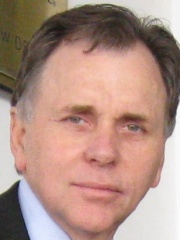
5. Barry Marshall (b. 1951)
With an HPI of 65.72, Barry Marshall is the 5th most famous Australian Physician. His biography has been translated into 64 different languages.
Barry James Marshall (born 30 September 1951) is an Australian physician, Nobel Laureate in Physiology or Medicine, Professor of Clinical Microbiology and Co-Director of the Marshall Centre at the University of Western Australia. Marshall and Robin Warren showed that the bacterium Helicobacter pylori (H. pylori) plays a major role in causing many peptic ulcers, challenging decades of medical doctrine holding that ulcers were caused primarily by stress, spicy foods, and too much acid. This discovery has allowed for a breakthrough in understanding a causative link between Helicobacter pylori infection and stomach cancer. He is a prominent example, in the tradition of Jonas Salk, of testing a medical hypothesis by self-administration.

6. Elizabeth Kenny (1880 - 1952)
With an HPI of 49.35, Elizabeth Kenny is the 6th most famous Australian Physician. Her biography has been translated into 19 different languages.
Sister Elizabeth Kenny (20 September 1880 – 30 November 1952) was a self-trained Australian bush nurse who developed an approach to treating polio that was controversial at the time. Her method, promoted internationally while working in Australia, Europe and the United States, differed from the conventional one of placing affected limbs in plaster casts. Instead, she applied hot compresses, followed by passive movement of the areas to reduce what she called "spasm". Her principles of muscle rehabilitation became the foundation of physical therapy or physiotherapy in such cases. Her life story was told in a 1946 film, Sister Kenny, where she was portrayed by Rosalind Russell, who was nominated for the Academy Award for Best Actress for her performance.
People
Pantheon has 6 people classified as Australian physicians born between 1880 and 1951. Of these 6, 2 (33.33%) of them are still alive today. The most famous living Australian physicians include Peter C. Doherty, and Barry Marshall. The most famous deceased Australian physicians include John Eccles, Robin Warren, and Howard Florey.
Living Australian Physicians
Go to all RankingsDeceased Australian Physicians
Go to all RankingsJohn Eccles
1903 - 1997
HPI: 70.57
Robin Warren
1937 - 2024
HPI: 69.85
Howard Florey
1898 - 1968
HPI: 68.81
Elizabeth Kenny
1880 - 1952
HPI: 49.35
Overlapping Lives
Which Physicians were alive at the same time? This visualization shows the lifespans of the 4 most globally memorable Physicians since 1700.

